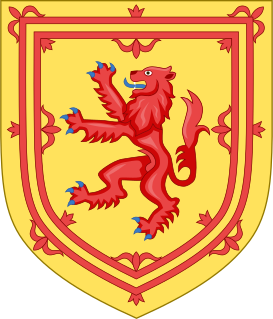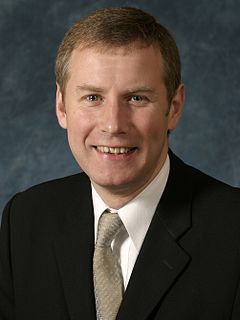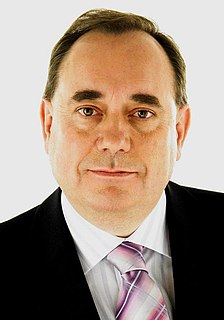Related Research Articles
The Scottish National Party is a Scottish nationalist and social democratic political party in Scotland. The SNP supports and campaigns for Scottish independence from the United Kingdom and for membership of the European Union, with a platform based on civic nationalism. The SNP is the largest political party in Scotland, where it has the most seats in the Scottish Parliament and 45 out of the 59 Scottish seats in the House of Commons at Westminster, and it is the third-largest political party by membership in the United Kingdom, behind the Labour Party and the Conservative Party. The current Scottish National Party leader, Nicola Sturgeon, has served as First Minister of Scotland since 20 November 2014.

Scottish independence is the political movement for Scotland to become a sovereign state, independent from the United Kingdom.

The politics of Scotland operate within the constitution of the United Kingdom, of which Scotland is a home nation. Scotland is a democracy, being represented in both the Scottish Parliament and the Parliament of the United Kingdom since the Scotland Act 1998. Most executive power is exercised by the Scottish Government, led by the First Minister of Scotland, the head of government in a multi-party system. The judiciary of Scotland, dealing with Scots law, is independent of the legislature and the executive. Scots law is primarily determined by the Scottish Parliament. The Scottish Government shares some executive powers with the Government of the United Kingdom's Scotland Office, a British government department led by the Secretary of State for Scotland.

The 2003 Scottish Parliament election, was the second election of members to the Scottish Parliament. It was held on 1 May 2003 and it brought no change in terms of control of the Scottish Executive. Jack McConnell, the Labour Party MSP, remained in office as First Minister for a second term and the Executive continued as a Labour and Liberal Democrat coalition. As of 2021, it remains the last Scottish Parliament election victory for the Scottish Labour Party.

James Robert Wallace, Baron Wallace of Tankerness,, FRSE is a Scottish politician serving as a Non-Affiliated life peer in the British House of Lords since 2007 and Moderator of the General Assembly of the Church of Scotland since 2021. He served as the Deputy First Minister of Scotland from 1999 to 2005, and during that time he served twice as acting First Minister, in 2000, in the aftermath of Donald Dewar's death and in 2001, following Henry McLeish's resignation. He was formerly Leader of the Scottish Liberal Democrats from 1992 to 2005 and Liberal Democrats in the House of Lords from 2013 to 2016.

The Scottish devolution referendum of 1997 was a pre-legislative referendum held in Scotland on 11 September 1997 over whether there was support for the creation of a Scottish Parliament with devolved powers, and whether the Parliament should have tax-varying powers. The result was "Yes–Yes": a majority voted in favour of both proposals, and the Parliament was established following an election in 1999. Turnout for the referendum was 60.4%.

Nicol Ross Stephen, Baron Stephen is a Scottish politician who served as Deputy First Minister of Scotland and Minister for Enterprise and Lifelong Learning from 2005 to 2007. A member of the Scottish Liberal Democrats, he was the Member of the Scottish Parliament (MSP) for Aberdeen South from 1999 to 2011, and was leader of the Scottish Liberal Democrats from 2005 to 2008.
The Scottish Liberal Democrats is a liberal, federalist political party in Scotland, a part of the United Kingdom Liberal Democrats. The party currently holds 4 of the 129 seats in the Scottish Parliament and 4 of the 59 Scottish seats in the UK House of Commons.
In Scotland, the Scottish Socialist Party (SSP) is a left-wing political party. The party was formed in 1998 from an alliance of left-wing organisations in Scotland. In 1999, it saw its first MSP returned to Holyrood, with five more MSPs elected in 2003. It lost all MSPs in the 2007 elections and has lacked representation in the Scottish Parliament ever since.

The 2011 Scottish Parliament election was held on Thursday, 5 May 2011 to elect 129 members to the Scottish Parliament.

The 2007 Scottish Parliament election was held on Thursday 3 May 2007 to elect members to the Scottish Parliament. It was the third general election to the devolved Scottish Parliament since it was created in 1999. Local elections in Scotland fell on the same day.
This is a list of opinion polls for the 2007 Scottish Parliament election. The first figure for each party is for the 1st, first-past-the-post, constituency, vote; the second figure is for the 2nd, proportional representation, regional, vote. The Scottish Greens and the Scottish Socialist Party ran only one constituency candidate each in the 2007 election so constituency values in polls for those parties have little meaning.

Full fiscal autonomy (FFA) – also known as devolution max, devo-max, or fiscal federalism – is a particular form of far-reaching devolution proposed for Scotland. The term has come to describe a constitutional arrangement in which instead of receiving a block grant from the UK Exchequer as at present, the Scottish Parliament would receive all taxation levied in Scotland; it would be responsible for most spending in Scotland but make payments to the UK government to cover Scotland's share of the cost of providing certain UK-wide services, including at least defence and the conduct of foreign relations. Scottish fiscal autonomy – stopping short of full political independence – is usually promoted by advocates of a federal constitution for the United Kingdom.

The Commission on Scottish Devolution, also referred to as the Calman Commission or the Scottish Parliament Commission or Review, was established by an opposition Labour Party motion passed by the Scottish Parliament on 6 December 2007, with the support of the Conservatives and Liberal Democrats. The governing Scottish National Party opposed the creation of the commission.

The Scotland Act 2012 is an Act of the Parliament of the United Kingdom. It sets out amendments to the Scotland Act 1998, with the aim of devolving further powers to Scotland in accordance with the recommendations of the Calman Commission. It received Royal Assent in 2012.

John Bradford Finnie is a Scottish Greens politician. He was the Green Member of the Scottish Parliament (MSP) for the Highlands and Islands region from 2016 up until 2021, having previously sat as a Scottish National Party (SNP) member from 2011 to 2012 then as an independent from 2012 to 2016.

The Scottish Socialist Party is a left-wing political party campaigning for the establishment of an independent socialist Scotland.
The Smith Commission was announced by Prime Minister David Cameron on 19 September 2014 in the wake of the 'No' vote in the 2014 Scottish independence referendum. The establishment of the commission was part of the process of fulfilling The Vow made by the leaders of the three main unionist parties during the last days of the referendum campaign. The Vow promised the devolution of more powers from the Parliament of the United Kingdom to the Scottish Parliament in the event of a No vote.

The 2015 United Kingdom general election in Scotland was held on 7 May 2015 and all 59 seats were contested under the first-past-the-post electoral system. Unlike the 2010 general election, where no seats changed party, the Scottish National Party (SNP) won all but three seats in Scotland in an unprecedented landslide victory, gaining a total of 56 seats and taking the largest share of the Scottish vote in sixty years, at exactly 50 per cent. The Labour Party suffered its worst ever election defeat in Scotland, losing 40 of the 41 seats they were defending, including the seats of Scottish Labour leader Jim Murphy and the then Shadow Foreign Secretary Douglas Alexander. The Liberal Democrats lost ten of the eleven seats they were defending, with the then Chief Secretary to the Treasury Danny Alexander and former leader Charles Kennedy losing their seats. The election also saw the worst performance by the Conservative Party, which received its lowest share of the vote since its creation in 1965, although it retained the one seat that it previously held. In all, 50 of the 59 seats changed party, 49 of them being won by first-time MPs.
References
- ↑ "Most Scots 'oppose' council tax". 15 February 2004. Retrieved 11 March 2014.
- ↑ "Official Report Debate Contributions - Parliamentary Business". 1 February 2006. Retrieved 19 November 2013.
- ↑ "SSP sets out 'service tax' plan". 27 May 2004. Retrieved 11 March 2014.
- ↑ "Socialists targeting council tax". 5 October 2004. Retrieved 11 March 2014.
- ↑ "Council tax: the alternatives". 8 February 2004. Retrieved 11 March 2014.
- ↑ "Council Tax Abolition and Service Tax Introduction (Scotland) Bill - Policy Memorandum" (PDF). Retrieved 28 February 2015.
- ↑ Local income tax on way as early as 2010, The Scotsman , 19 August 2007
- ↑ Scrapping council tax has £400m price tag - Browne, The Scotsman , 20 August 2007
- ↑ "Hutton: there'll be no £381m to aid tax plans". 25 April 2007. Retrieved 2 December 2014.
- ↑ "Benefits to continue under Labour tax plans but not SNP's". 15 September 2008. Retrieved 2 December 2014.